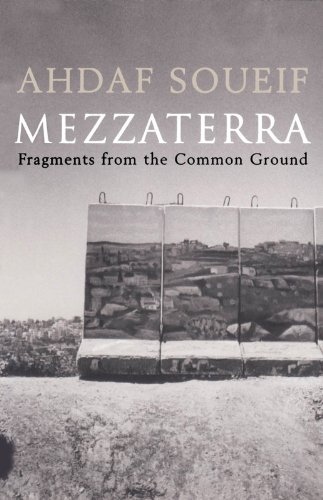Mezzaterra: fragments from the common ground, by Ahdaf Soueif
A glimpse of hope in a polarised world By Guy Mannes-Abbott November 2004
Ahdaf Soueif is best known for The Map of Love, a novel which did much to
open up the minds of English-speaking readers to Egyptian modernity. It
brilliantly interwove the love affair of an English colonial woman and an
Egyptian nationalist in the early 20th century with a burgeoning national
"renaissance", and was shortlisted for the Booker Prize in 1999.
That book followed an earlier novel and two collections of stories. However,
the political writing she began in 2000 with Under the Gun has made her a
writer of special importance. Mezzaterra includes "The Waiting Game", her
brave, despairing return to the occupied heart of Palestine, and a recent
portrait of Palestinian writers under existential siege.
Mezzaterra's second half, literary pieces from two decades in London, is the
surprising bonus. It includes reviews of writers from Jean Genet and Amitav
Ghosh to Philip Hensher, along with pieces on al-Jazeera, Islamic "queens"
and "the veil": a term without an Arabic equivalent. Each exhibits Soueif's
demanding exactitude, whereby she will apologise for making "small points"
before demonstrating their full import. Words, she proves repeatedly,
matter.
Soueif is obsessed with language and power, the way words like "freedom" and
international laws are abused when applied to Islamic contexts. She dissects
sloppy mistranslations of Arabic and ideological cliches about Islam. More
subtle difficulties loom when transliterating her own name from the Arabic
as Soueif, in contrast to her brother, Ala Swafe. Reviewing William
Golding's An Egyptian Journal, she takes elegant revenge for Ala's
anonymously belittled efforts to coach the author in such subtleties.
The brilliance of this collection lies in Soueif's linkage of "small" things
to universal categories. She praises her friend Edward Said for being
"human", "fair" and "inclusive", qualities that describe the "mezzaterra" of
her title. This common ground, where differences enrich rather than clash,
is civilisation. A "with us or against us" world, with its "war on terror"
and "peace process", is the opposite.
Souief is transfixed by the Palestinian uprising. She writes, contra Said,
of having always felt "essentially in place: Egyptian, Muslim". So, writing
about Israel's dispossession of the Palestinians in front of a wilfully
diverted world, her combination of centred gravity, minute precision and
insistent humanity generates highly clarified truth.
The truth makes for bleak reading, as her nightmares materialise in massive
Israeli settlements. "And yet there is still hope," she writes, even in
ravaged Ramallah where Palestinian writers like Liana Badr and Adania Shibli
shape exquisite stories against chronic injustice. The only real hope is for
"a viable Palestine". Although it may require courage, take these marvellous
essays to heart.
Mezzaterra: fragments from the common ground
فعاليات

العربية السعيدة في بيت يكن
إبريل 15, 2025
العربية السعيدة، لتوركل هانسن وترجمة سوسن كردوش قس...

الأديب: رؤية ومسيرة ... حوار مع إيلان بابيه عبر زووم
مارس 15, 2025
تمت هذه الحلقة في 15 مارس 2025 ، تستطيع الان مشاهد...

مسافر يبحث عن ماء
فبراير 17, 2025
تقيم نقابة اتحاد كتاب مصرشعبة أدب الرحلات تحت رعاي...

مناقشة رواية النباتية لهان كانج الحاصلة على جائزة نوبل للأدب
نوفمبر 08, 2024
تمت منااقشة رواية النباتية يوم الجمعة 8 نوفمبر 202...
